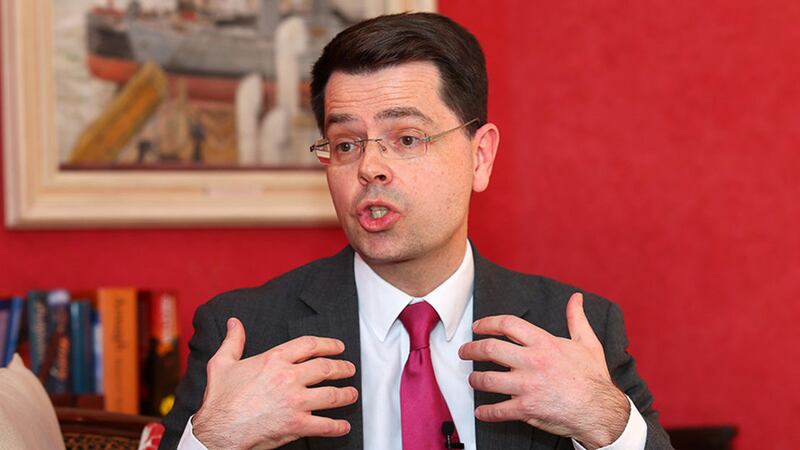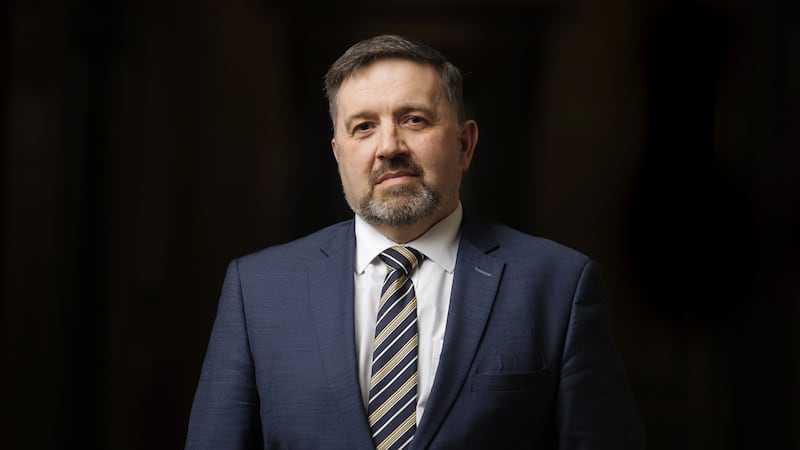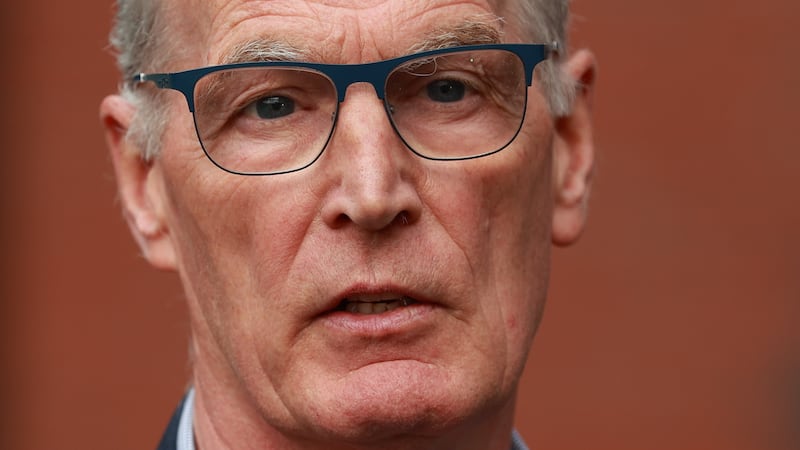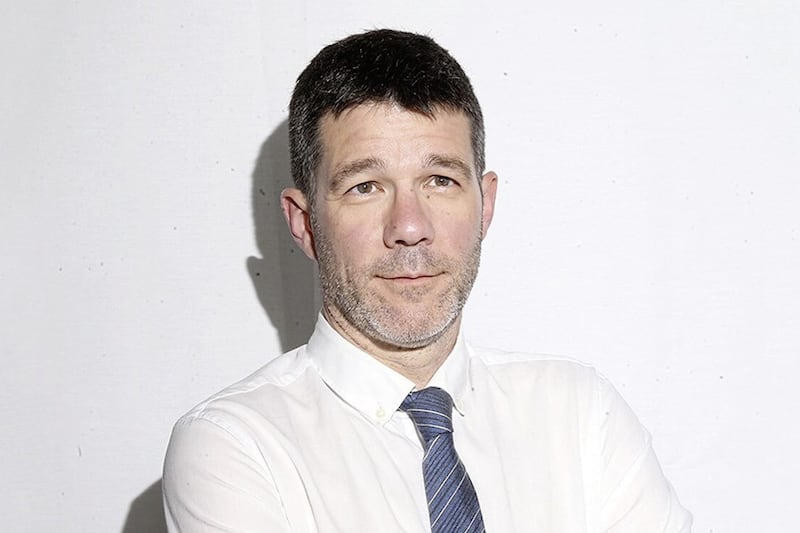The British government will not release money for Troubles inquests until agreement is reached on all legacy issues, the secretary of state has said.
James Brokenshire said that funds to conduct dozens of inquests are contingent on a comprehensive settlement.
In 2015’s Stormont House Agreement, the British government pledged £150m to help address the legacy of the north’s toxic past.
In February last year Lord Chief Justice Declan Morgan appealed for £10m to carry out dozens of Troubles inquests. He said the proposed legacy inquest unit could clear a backlog of 56 cases within five years, if funding was put in place. However, the money has not been released by the British government.
Mr Brokenshire did not accept that the British government was responsible for withholding the funding and said it was up to the Stormont executive to request the money.
However, the secretary of state said only when the Stormont House Agreement was implemented in full would the cash for inquests be made available.
Sinn Féin cut short a meeting with the Mr Brokenshire on Tuesday, accusing the Tory MP of “waffle, waffle and more waffle”.
The criticism centred on the secretary of state’s refusal to release the funds for legacy inquests.
“I see all of this needing to move together forward in a rounded way,” Mr Brokeshire said in his first interview with the Irish News.
“The UK government remains committed to the £150m over the five year period towards the legacy institutions – that very firmly remains there.”
Mr Brokenshire, who has been Northern Ireland Secretary of State for almost eight months, said the inquest funds formed part of the British government’s Stormont House Agreement commitments and he wanted to see that deal “followed through”.
“If we have the Storming House Agreement implemented, if we are actually seeing the process moving forward in relation to that, the UK government stands behind its commitments over the five-year period to deliver £150m to see the legacy bodies under Stormont House, and more broadly those legacy institutions, supported and funded,” he said.
Asked if it was an ‘all or nothing’ situation, the secretary of state insisted that all the parties had signed up to that condition in the December 2015 accord.
“That’s what Stormont House said – that was the commitment we made as a government – that it is all of that package that we are prepared to support and we stand absolutely behind that,” he said.
He also insisted that progress on legacy issues had been made before the Renewable Heat Incentive scandal ignited in December but conceded this was “behind the scenes”.
Mr Brokenshire said he stood over his remarks in January where he claimed a disproportionate number of Troubles prosecutions focused on members of the state forces.
He said he would support the prosecution of soldiers involved in the killing of 13 civilians on Bloody Sunday if there was evidence of wrongdoing.
“If there is evidence that someone has broken the law then that must pursued,” he said.
“The only issue I say and consistent with what everybody has seen on the Stormont House Agreement is how we approach this in a fair, balanced and proportionate way.”
James Brokenshire speaks to political correspondent John Manley
In relation to legacy, do you believe the British government is partly responsible for holding up a resolution of the legacy issue?
I know this has been one of those fundamental issues that has bedevilled so much of agreement and so much of what has gone before my appointment as secretary of state, and the parties, ourselves, the Irish government, all have a clear role to play here. I stand four square behind the Stormont House Agreement and the bodies that need to be put in place from that. I continue to believe that provides the clear framework from where we stand now and what I want to see is that intensification of work.
That is what I am committed to do during this talks process, during the three weeks, so that we are able to get to a conclusion on this – on those legacy bodies and also in relation to legacy inquest reform as well, because I think it is that sense of people looking for justice, looking for answers, looking for some form of resolution and that this can play a significant contribution.
So that is what I am committed to do as part of this talks process that we have and I think with that sense of good will, that strong sense of intent that I feel on this, and I believe will be shared by the parties themselves, I do believe we have that opportunity now to reach that positive outcome.
Up until November we were going nowhere with Stormont House and I’ll ask you again, is the British government partly or wholly responsible for the failure to resolve legacy issues?
I don’t see it in those terms because the UK government has a clear role to play here. We have been working closely with the main political parties to reach a resolution. Indeed that is very much has been my intention to do so. Yes there are complicated issues involved in all of this and actually Stormont House, yes set the framework but the devil is always in the detail in terms of implementation.
That is why it has taken longer than I would have wished it to but the commitment, the resolve is absolutely there. I understand clearly why people want to see this move forward because it’s not just about politics, it’s not just about words on a piece of paper – it’s about people’s lives and being able to get answers that for so long have not been answered and seeing it done in that balanced, fair way that I think Stormont House clearly telegraphs.
You’ve suggested the British government has no responsibility for the failure to resolve legacy issues, where then does responsibility lie? Up until November when the current crisis began, we were still no further on in terms of Stormont House implementation.
I don’t accept that progress wasn’t being made.
There were no obvious signs of progress…
A lot of this is behind the scenes and as I say I think things have taken longer than I think all of us would have wanted to see. But I think there is a real will, a real intent and that’s why I don’t think it’s about blaming anyone around all of this. I think that there is that clear commitment that I feel in terms of how we’re able to make this happen and why I very much want to see, as part of the talks process we have started, a real intensification around this. I think this can be done and that is what I’m intent on seeing happen in the days ahead.
Declan Morgan asked for funding and believed he could resolve many of the legacy issues. I believe the British government holds the purse strings in that regard?
We don’t and let’s just be clear on this that legacy fits very firmly within the devolved space and the UK government received no request for funding for this in terms of the executive, so I just need to clarify on that. But it’s also the fact, and the lord chief justice rightly pointed out, that it is about reform of the system and the process too. Because that was something that was in my party’s manifesto - that we do see reform of the legacy inquest process.
I see all of this needing to move together forward in this rounded way. The UK government remains committed to the £150m over the five year period towards the legacy institutions – that very firmly remains there. What I want to see is the Stormont House Agreement followed through; those commitments that have been given by all of the parties to that, as well as in relation to legacy inquest reform so that we can make this happen and make sure it’s delivered.
So if you got the go-ahead tomorrow from the executive would you release that money for the inquests?
If we have the Stormont House Agreement implemented, if we are actually seeing the process moving forward in relation to that, the UK government stands behind its commitments over the five-year period to deliver £150m to see the legacy bodies under Stormont House more broadly those legacy institutions supported and funded. And we remain completely committed to delivering on that which is why I do want to see progress being made – not just because it’s satisfying an agreement but also because of the reality of what that means.
But you would release the money for the inquests?
It is part of the Stormont House Agreement that we have that package of funding that is there to implement the Stormont House bodies – things like the Historical Investigations Unit, the oral history archive and the UK government’s contribution to that in relation to those aspects and legacy more broadly is that £150m.
So it’s all or nothing?
That’s what Stormont House said. That was the commitment we made as a government – that it is all of that package that we are prepared to support and we stand absolutely behind that.
Your Sunday Telegraph platform piece (in January) was described by one commentator as the most inept intervention of 18 secretaries of state in 44 years, do you regret writing those words suggesting there was an imbalance in historic prosecutions?
I take it back to the conversation we’ve just had around the Stormont House Agreement, where that agreement underlined the need for a balanced, fair and proportionate system. And that was what I was underlining – the need for us to get on implement the Stormont House Agreement.
But you said there was a disproportionate amount of prosecutions (for members of the state forces), do you stand by that?
My words stand on record. On the statements of the UK government on the need for a balanced, fair and proportionate approach in relation to legacy and everything I said then and everything I’ve said in relation to creating a framework is entirely consistent because I do want to see that balanced, fair and proportionate system – I think that’s what victims need. I think that all of those who look for answers in relation to this and are subject to these arrangements, are really met by those commitments that are there. And as I’ve said consistently, and some have sought to suggest I was arguing for amnesties – I’m not. I’ve never said that either privately or publicly.
That is not the UK government’s position. That is not what was in Stormont House Agreement because it is that rule of law that I have always believed in – one of the fundamental principles that I have always stood by as a politician – it is how we take that forward in a fair, balanced and proportionate way, which is what the Stormont House Agreement framework actually provides the solution here.
Despite all the evidence suggesting there is not a disproportionate amount of prosecutions of the state forces, you are standing by that assertion made in the Sunday Telegraph?
I stand by the comments I have made but it’s also the fact that the system is not working for victims, is not working for everyone. So if you look at this in the fair, balanced and proportionate way then the system is letting down everyone. That’s why I recognise the points that many people have made on all sides of the political sphere here of the need for change – I entirely agree with them. The system is not working for everyone.
I think it is letting so many people down, in so many different ways; victims being foremost of that, as I have identified in previous speeches and equally in contributions I’ve made in interviews like this. It is with that intent that I approach the days ahead of getting a system that does work, that is fair, balanced and proportionate, that therefore works for victims and works for everyone and that is the sole intent that I have in approaching the time ahead.
You’ve said you don’t support an amnesty, so in circumstances where there is a body of evidence where a prosecution of a member of the state forces has merit, you would support that?
Yes, I believe in the rule of law. If there is evidence that someone has broken the law then that must pursued. The only issue I say and consistent with what everybody has seen on the Stormont House Agreement is how we approach this in a fair, balanced and proportionate way. That’s the simple message I’m giving. If there is evidence someone has committed a crime, absolutely.
OK, Lord Saville’s report would suggest there were many crimes committed, including potentially murder, on Bloody Sunday. Would you support the prosecution of British soldiers for their role in Bloody Sunday?
The legacy investigation branch of the PSNI is investigating that incident therefore I need to be careful in terms of an ongoing criminal prosecution or otherwise that may arise. Can I be clear? And I remember saying this previously that if there is evidence of criminality, of whoever that may be, then it is right and proper that that be pursued by law enforcement and by the prosecution authorities. And as I said in the House of Commons just about two weeks ago, I stand in support of those who investigate this and those who are looking to be involved in prosecution decisions.
I’m taking from those comments that you do support the prosecution of British soldiers for their role in the Bloody Sunday killings?
Where there is evidence of criminality by whomever it may be, whether it be a soldier, whether it be a terrorist, whether it be anyone, we all stand equal before the law and that is the simple framework that I adopt in relation to this and therefore the approach that prosecutors, the police, have taken. It is therefore how we do this in a fair, balanced and proportionate way that I strongly believe need to be adopted which is why I do make the point the implementation of the Stormont House Agreement, and how I see that delivering on that a fair, balanced and proportionate way forward.
Brokenshire on Brexit
Brexit is coming and there’s great concern about that. Do you believe we’ll have border posts?
I’m actually positive in relation to how we can do this. I was in Brussels last week talking to MEPs, representatives of the European Commission and permanent representatives from a number of member states, the strong impression I got was of a positive good will, a recognition of the Good Friday Agreement, the role that the EU played in relation to that in actually supporting that and the continued work that has existed since then. And I think a clear intent to find a way that respects that and does not lead to visible borders – that sense of border posts that some have sought to highlight.
That is absolutely not what I want to se and while we do have a negotiation to come, I remain optimistic and positive as to what can be achieved here, for those really essential reasons of identity, of the importance this has played in relation to the political progress that we’ve seen in Northern Ireland over many, many years. I remain positive as to what we can achieve and with that evident sense of good will in Brussels I remain optimistic of what we can achieve.
We’re leaving the single market so there will be issues with the movement of goods between the north and the south. How do we overcome that? You must have some idea rather than just an abstract aspiration?
This was something covered in our white paper on the 12 priorities that the prime minister set out in her speech and a specific annex that was set up in that paper that dealt with issues in relation to Ireland, underlining the importance that we attach to this as a government. We said in that that one of the key elements around this is the movement of goods and the customs union. What we set out was our priority not to return to the borders of the past and we know the implications of how it was those customs posts that were attacked during the height of the Troubles.
We are setting out that clear ambition and being flexible as to how that can be achieved, which is why the prime minister said and also reflected in the white paper, how this may mean potentially associate of the customs union and may mean a bespoke customs agreement with the EU. So it is right for us to set out our priorities, right for us to set out our objectives, as we’ve done in the white paper suggesting ways this could be pursued in order that we do get to that positive goal of having border arrangements as they are now – not having that sort of friction that stops people being able to travel over the border. That is our clear intent and our clear ambition and why in the white paper we set it out in that way.
Of course in that situation there will be implications for the movement of goods between Britain and Northern Ireland?
We want to achieve an outcome that has what you might describe as the UK single market in relation to goods and services. How that then fits in to the overall market within the EU, which is why the prime minister made that point on the associate membership of the customs union or a bespoke customs agreement in order to support and facilitate that. It is important to state it in those terms – yes we recognise specific factors, specific circumstances, unique factors on the island of Ireland that we do want to see addressed and responded to as part of the negotiations ahead.
But I think it underlines that sense of being able to have no return to the borders of the past, using that positive goodwill that I see from the EU and finding that solution that ensures we have no barriers emerging between Northern Ireland being able to trade with the UK. We see that as part of the UK single market, reflective of all nations of the UK. But securing that deal and that agreement with our EU partners that allows the seamless flow of gods, the seamless ability of people to travel across the border between Northern Ireland and the Republic of Ireland without hassle or friction, without those boundaries that some people have been concerned about.
The people of Northern Ireland voted overwhelmingly to remain within the EU, it’s suggested that support for remaining may have even grown now that people see the full the implications of Brexit. You talk about a bespoke customs union, do you support some kind of special status for Northern Ireland?
I think it’s important that we do recognise the unique circumstances and unique factors that are here on the island of Ireland, it’s why we made the point in the white paper over the Ireland Act 1949, the special arrangements that exist within UK law in relation to Irish citizens and vice-versa the arrangements that exist in the other direction. That ability for us to have those arrangements with the Irish government: the common travel area; issues around the single electricity market; there other real life issues on the ability of the health service to operate here on the island of Ireland. It is all these matters that we know need addressed and responded to in relation to that.
Does that constitute special status?
It constitutes special circumstances, special arrangements that need to be addressed.
You previously said there’d be no special status?
When you use the term ‘special status’ that implies that somehow Northern Ireland will be remaining within the European Union and that is how it is interpreted by a number of other EU member states, and that’s why they have pushed back themselves. And that’s the message I got from partners in Brussels last week over that sort of concept and what that implies. That’s why I have said we need to address and respond to these particular factors and circumstances. I have been underlining my responsibilities within Whitehall for the UK government in order that we get the best deal for Northern Ireland within the UK but outside of the EU.








